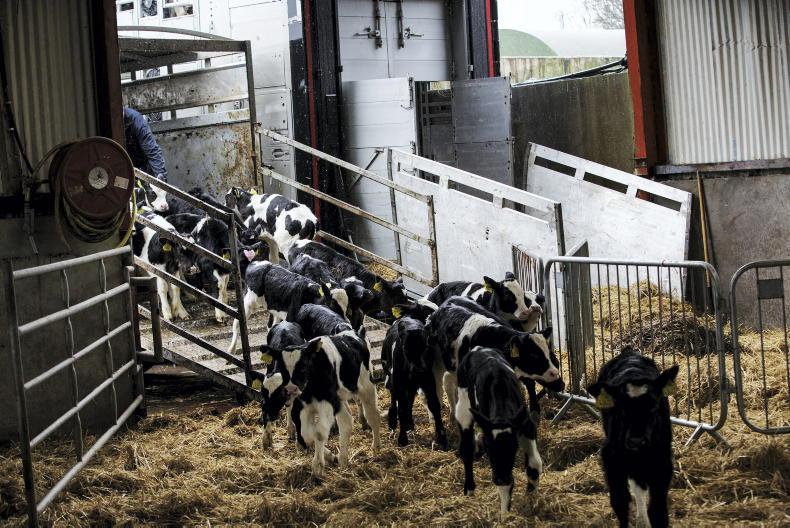Most of the content within new animal transport regulations proposed by the EU are not “sufficiently referenced nor backed by solid scientific evidence”, according to Copa-Cogeca, the European farmers and agri-cooperatives representative group.
The group was speaking following a vote by the European Parliament’s Committee on Inquiry on the Protection of Animals during Transport (ANIT) on Thursday.
Last-minute amendments to proposed animal transport regulations made ahead of the vote could lead to a ban on the transport of pregnant animals in the last third of gestation, transport time limits of two hours for unweaned animals older than 35 days and a ban on all transport for young animals under 35 days.
The new recommendations will go to a full vote of the European Parliament at Strasbourg in January and, if passed there, may be implemented as early as 2023.
Need for revision
A spokesperson for Copa-Cogeca said it agrees there is a need for a revision of current animal transport regulations after the 16 years since they were first approved, but said some of the measures proposed on Thursday are “disappointing and worrying for EU farmers”.
The group said the revision to the regulations should be “based on solid science, focusing on the quality of the [animal] journey and tackling the shortcomings in the application of the legislation”.
The spokesperson said a “science-based update” is needed and could “guarantee a harmonised enforcement and implementation” of animal welfare measures across EU member states.
Outcome based on emotion
The group warned that the amendments introduced on Thursday evening may end up damaging the sector and will base the outcome following the January plenary session more on emotions rather than facts.
While welcoming the opportunity to review EU animal welfare legislation in a holistic manner, with a “robust scientific basis”, chair of the working party on animal welfare Miguel Angel Higuera said: “EU standards on animal welfare are among the highest in the world.”

The new proposals may ban the export of unweaned animals younger than five weeks of age. / Donal O' Leary
“This should be highlighted and better conveyed to EU citizens and consumers.
“Transportation of live animals plays a vital role in maintaining the economic strength and social vibrancy of territories across the EU.”
Science-based
Copa-Cogeca said it recommends that the European Commission looks into science-based adjustments and technologies as a way to improve the quality of animal transport.
“The quality of the environment in the vehicles for animal transport is very important for animal welfare, which includes factors like ventilation, temperature, ceiling height, the nature of the floor and space allowance.
“At this point in time, it is not possible to replace exports of live animals with exports of semen and embryos for breeding, or carcasses for animals intended to be slaughtered, as these are completely different markets which require different logistics and know-how. Therefore, focusing on animal welfare and quality of journey is key.”
Most of the content within new animal transport regulations proposed by the EU are not “sufficiently referenced nor backed by solid scientific evidence”, according to Copa-Cogeca, the European farmers and agri-cooperatives representative group.
The group was speaking following a vote by the European Parliament’s Committee on Inquiry on the Protection of Animals during Transport (ANIT) on Thursday.
Last-minute amendments to proposed animal transport regulations made ahead of the vote could lead to a ban on the transport of pregnant animals in the last third of gestation, transport time limits of two hours for unweaned animals older than 35 days and a ban on all transport for young animals under 35 days.
The new recommendations will go to a full vote of the European Parliament at Strasbourg in January and, if passed there, may be implemented as early as 2023.
Need for revision
A spokesperson for Copa-Cogeca said it agrees there is a need for a revision of current animal transport regulations after the 16 years since they were first approved, but said some of the measures proposed on Thursday are “disappointing and worrying for EU farmers”.
The group said the revision to the regulations should be “based on solid science, focusing on the quality of the [animal] journey and tackling the shortcomings in the application of the legislation”.
The spokesperson said a “science-based update” is needed and could “guarantee a harmonised enforcement and implementation” of animal welfare measures across EU member states.
Outcome based on emotion
The group warned that the amendments introduced on Thursday evening may end up damaging the sector and will base the outcome following the January plenary session more on emotions rather than facts.
While welcoming the opportunity to review EU animal welfare legislation in a holistic manner, with a “robust scientific basis”, chair of the working party on animal welfare Miguel Angel Higuera said: “EU standards on animal welfare are among the highest in the world.”

The new proposals may ban the export of unweaned animals younger than five weeks of age. / Donal O' Leary
“This should be highlighted and better conveyed to EU citizens and consumers.
“Transportation of live animals plays a vital role in maintaining the economic strength and social vibrancy of territories across the EU.”
Science-based
Copa-Cogeca said it recommends that the European Commission looks into science-based adjustments and technologies as a way to improve the quality of animal transport.
“The quality of the environment in the vehicles for animal transport is very important for animal welfare, which includes factors like ventilation, temperature, ceiling height, the nature of the floor and space allowance.
“At this point in time, it is not possible to replace exports of live animals with exports of semen and embryos for breeding, or carcasses for animals intended to be slaughtered, as these are completely different markets which require different logistics and know-how. Therefore, focusing on animal welfare and quality of journey is key.”







 This is a subscriber-only article
This is a subscriber-only article











SHARING OPTIONS: